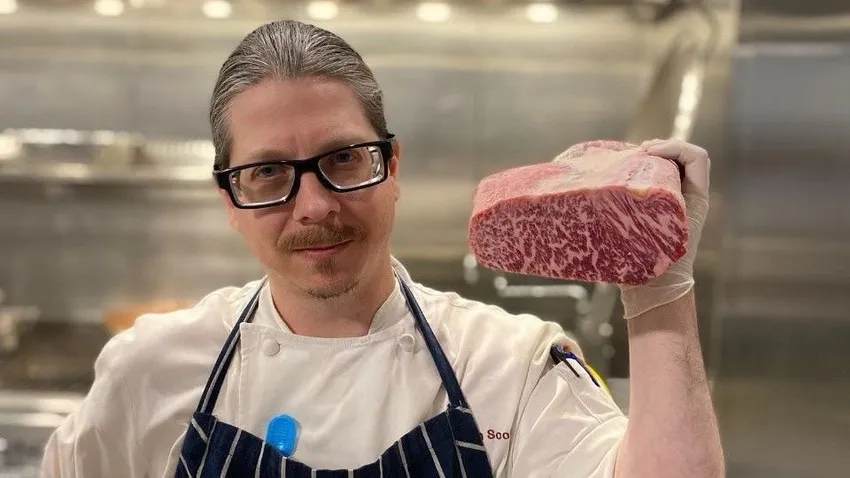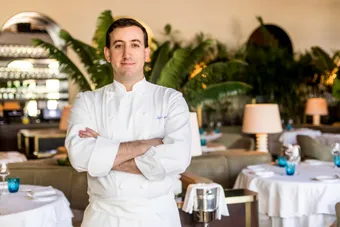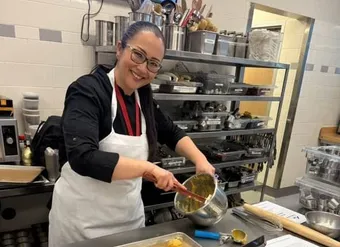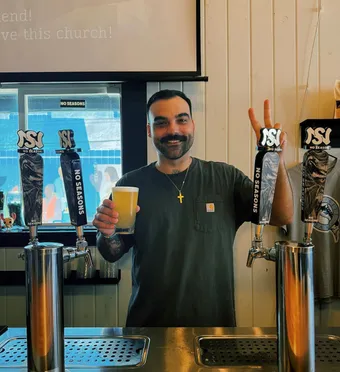What started with a chicken butcher's knife in Australia has led Chef Brendan Scott to the heart of New York City, where he's now bringing a taste of a Vegas classic to the city that never sleeps.
We at OysterLink recently sat down with Chef Brendan Scott, Executive Chef for Golden Steer New York, to talk about his journey.
Could you introduce yourself and tell us about your career path?
Brendan Scott: I'm currently the Executive Chef for Golden Steer New York. It's a new outpost of the famous Golden Steer in Las Vegas. It's been open since 1958. We're in the middle of the opening stages in New York.
I am from Australia originally; I started cooking in 1999. I was a chicken butcher during school. After school, I'd work in a butcher shop making sausages, boning chicken, and stuff like that. And upon completion of school, I found food was a good outlet for me, and I continued that.
I did a four-year apprenticeship, which back then was pretty grueling. A lot different than this day and age with pay and training.
I did my four-year apprenticeship and worked around numerous really good restaurants within my hometown of Brisbane, Queensland, Australia.
I worked for a very good chef in Australia, Chef Terry Galache. He opened a restaurant called Montrachet. I worked with him just after the opening, worked my way up to Sous Chef, and then I thought I needed to get more experience, so I headed to London on a work visa.
Ended with a really nice Italian restaurant in South Kensington called Daphne's, part of Caprice Holdings Group. Back then, the group wasn't as big as it is now; they ended up sponsoring me because my time was up, so they sponsored me to stay around in London and work there, so I worked my way up to Executive Sous Chef. Then I got the opportunity to come to New York. They decided to open one of their restaurants, Le Caprice, in the Pierre Hotel in New York, and they tasked me with being Executive Sous Chef in the Pierre Hotel.
We had a successful opening of Le Caprice, and then I stayed there for three years. Then they needed me back in London, so I went back to London to be Executive Sous Chef of J Sheekey. It's one of their institutions right there at Leicester Square in Covent Garden.
And then, after being there for three years, my wife, who worked for Thomas Keller at Per Se here in New York, had an opportunity to come back to work at Per Se. So, we packed up once again and came back to New York, and I found myself doing a tasting for various groups and Chef Andrew Carmelini from NoHo Hospitality.
Chef Carmelini is a legend. He's like a walking culinary encyclopedia, and to be able to learn from him and the operation of NoHo was a very big blessing for me.
So, they sponsored me on an O-1 visa. And then I worked at Lafayette. Stayed there for quite a few years, working my way up from Sous Chef to Chef De Cuisine. And then Andrew Carmelini and the Culinary Director at that time, Connor Hanlon, offered me the Opening Chef position at Carni Mare, an Italian chop house at the South Street Seaport, which is a massive operation, a huge restaurant with two floors, and a patio.
And we had to open post-COVID, which was one of the difficult challenges of my career, you know, sourcing, finding staff, sourcing ingredients, and delivery windows. But we managed to do it and had the support of NoHo and the great chefs there and their managing partners. We did it. We got some good feedback in some reviews and publications, and I was there for almost four years, running and having a great team. Then I decided to go back to Australia at the beginning of 2025, just to have some family time and sort out some family stuff, and then came back to New York, trying to find the right opportunity for me.
After being in the industry for so long, I wanted to find a good home, working for some great people, and I feel I've done that with the team at Golden Steer. So hopefully moving forward, we have a successful opening and build a great team, and start cooking some great food. So that's pretty much the quick outline of where I'm at.
Have you ever thought that cooking would take you from Australia to the UK to the US?
Brendan Scott: Not really! The UK definitely, because before Brexit, Europe was easy to travel around, and the culture in the kitchens in London back then was grueling. It was like starting at seven o'clock in the morning, and you don't finish until 1 a.m. It was grueling. Sometimes working with no breaks. Chefs were often suckers for punishment. That's the old-school kind of mentality. A lot's changed, but just being back in the trenches and working my way back up, I definitely wanted to get that European experience and the ingredients too.
The ingredients and the culture are really what drew me to London. But then in New York, the position just got thrown at me; the owners of Caprice Holdings offered it to me, and I thought, why not? You only get to live once. Just jumped at it and it managed to. I love New York. It's such a good place. It's just like there's so much going on, and you can do whatever you want. You put your mind to it. There's so much growth, so many restaurants. Just the condensed hospitality in New York.
What's the concept behind this new Las Vegas classic you're bringing to New York?
Brendan Scott: Golden Steer has been around since 1958. It's got deep roots in history throughout the dining room. And it's only been since I signed up to work for Golden Steer that I've had the opportunity to learn about it. And it's fascinated me that this building has been doing somewhat of the same concept for so many years successfully.
And I do like history in cooking and things behind it.
And having great owners too, family-oriented, operating with great people who look after everyone involved. It's a good opportunity to bring something fun to New York; often, New York restaurants get posted out to Vegas, right? And it never kind of goes the other way. So, it's like a playful opportunity to run a really nice steakhouse with, think of, a high level of service using prime cuts and great ingredients and just really selling that old-school vibe, which is really cool.
There are a bunch of New York steak houses that do it already; they've been around for a long time. Golden Steer is just going to be a little different twist on that with lots of Vegas vibes thrown in.
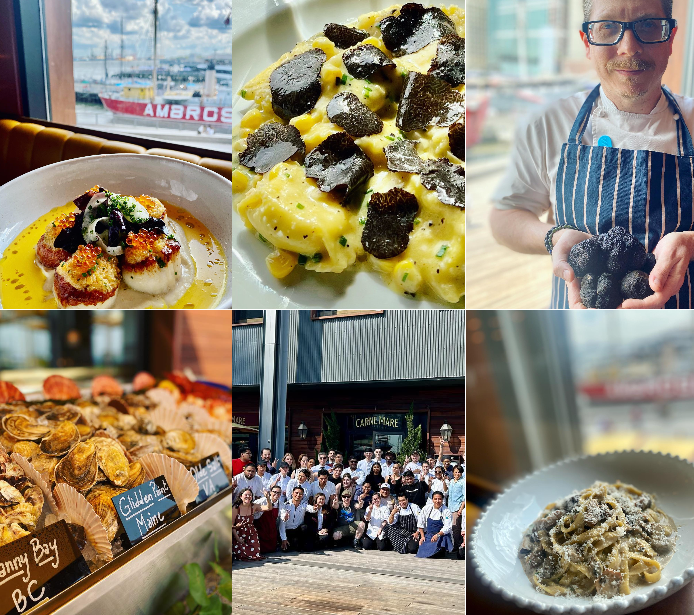
When do you expect it to open?
Brendan Scott: Right now, we're shooting for an early November opening. Obviously, with openings, there are always a lot of factors that go into it. It's always hard to pencil in dates, but we're shooting for around that. So, fingers crossed the build-out goes swimmingly, the hiring of staff is in a timely manner, and the training works well. So that's what we're shooting for now.
I'm blessed to have owners who have the same mindset and staff within the operations side that are going above and beyond to make sure it's done right and there's thoughtfulness behind everything, which is another reason I decided to join, based on that. They really have a vision, and I want to help them bring that to life on the culinary side.
Have you started recruiting for the New York place or not yet?
Brendan Scott: Yeah, just posted a couple of positions to touch the waters and see what people are looking for, especially with management positions. I like to ensure that if someone is going to leave an existing job in a management role that they give the previous establishment and the chef enough notice.
The chef's code: You should always give your chef enough notice. If you're going to leave, allow him time to replace you.
So, having the conversations with candidates to make sure, to give a rough timeline, then to organize the phone interview, then I like to do it in person. And obviously, a tasting definitely needs to get organized for a management position just to see how they manage themselves around the spice, flavor profile, seasoning, and stuff like that. It's very important to have the tasting, and they put their best foot forward with that.
So fingers crossed, we get some good candidates, and it helps if they've done an opening before, and not mandatory, but, you know, there definitely can be emotional times during the opening. So it's good to have some of that experience.
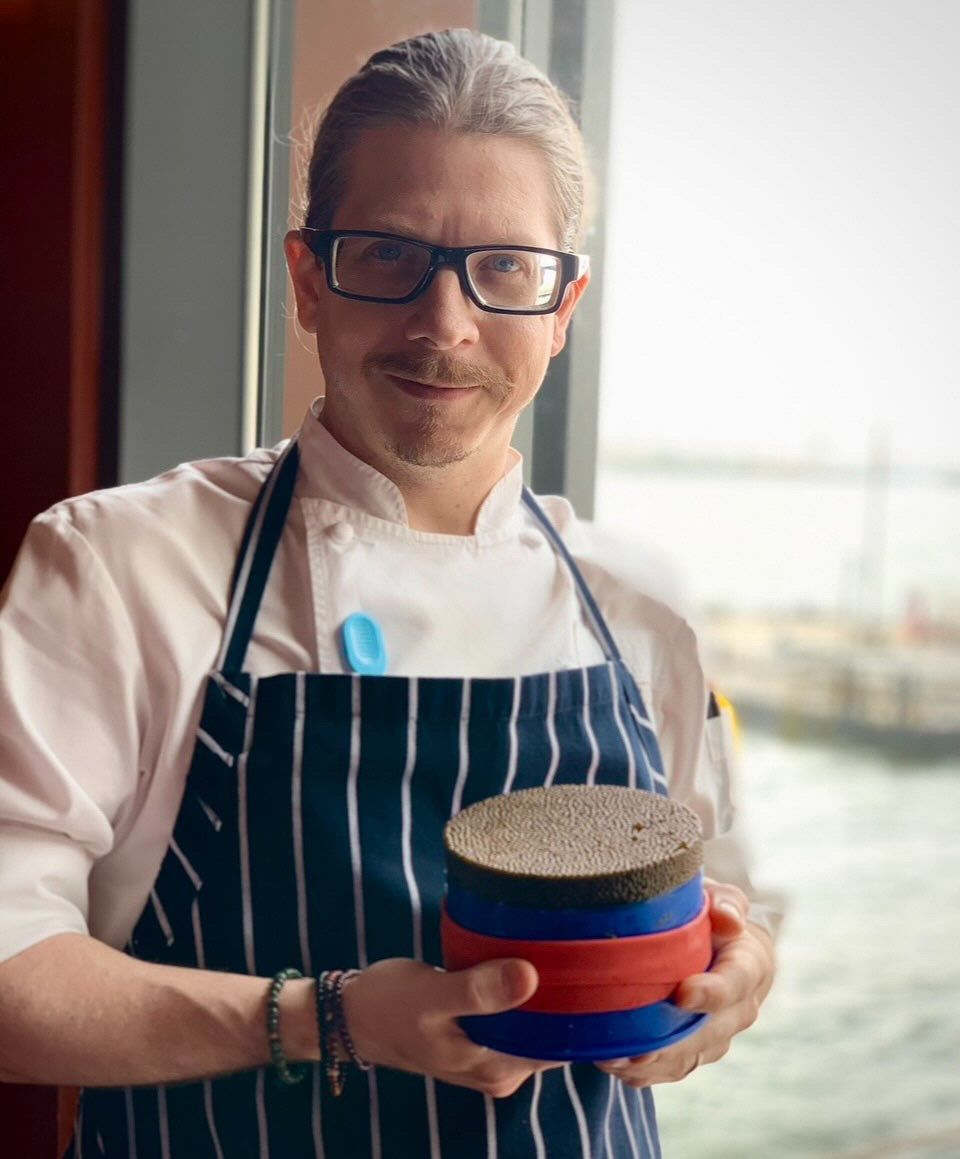
Soon you will have that "Day One" experience. By the end of that day, how can you define success? What's your metric for "We Had a Good Start"?
Brendan Scott: Well, it's all going to be based on the menu being the right size, the right offering with the current staffing level, and stuff like that. And you've done a lot of it before, even with friends and family, like during the R&D process, the recipes have been made and fine–tuned to the space. The team knows how to replicate them. The flow of service is crucial between Chef on The Line to Expo Chef, to the Runners, to the Front of House. It's like there are so many layers that need to be cohesive for it to run smoothly. At the end of day one, things are getting fired on time. There are no major delays.
So, there's no second-guessing any food that's going to hit the window. And then, you know, setting the tone with the team too, like having good vibes in the kitchen and everyone finishing on a high.
For me, a successful day would be to get to the end of service and get all the front of house and back of house together, and, you know, figure out what we can improve on.
What is the one thing that you would never compromise on when it comes to your guest experience?
Brendan Scott: I think the service is probably the most important part for me. A lot of chefs would say "food, food, food," but at the end of the day, the service is very, very important, and the service needs to match the food, and the food needs to match the service.
The food just needs to have integrity and needs to be seasoned correctly. And I wouldn't, as a chef, compromise the ingredients. Make sure that you're doing your best to source the best ingredients during the season as well. Try not to use, like, off-season products when you can.
You live in a state like New York; you have plenty of great seasonality and availability to it. So just don't compromise the food and the service standards. No matter how busy you are, no matter how slow you are, every guest deserves the same great service and the same great plate of food. Just because it's busy, you don't start slopping food through the window. Every plate has to be the same.
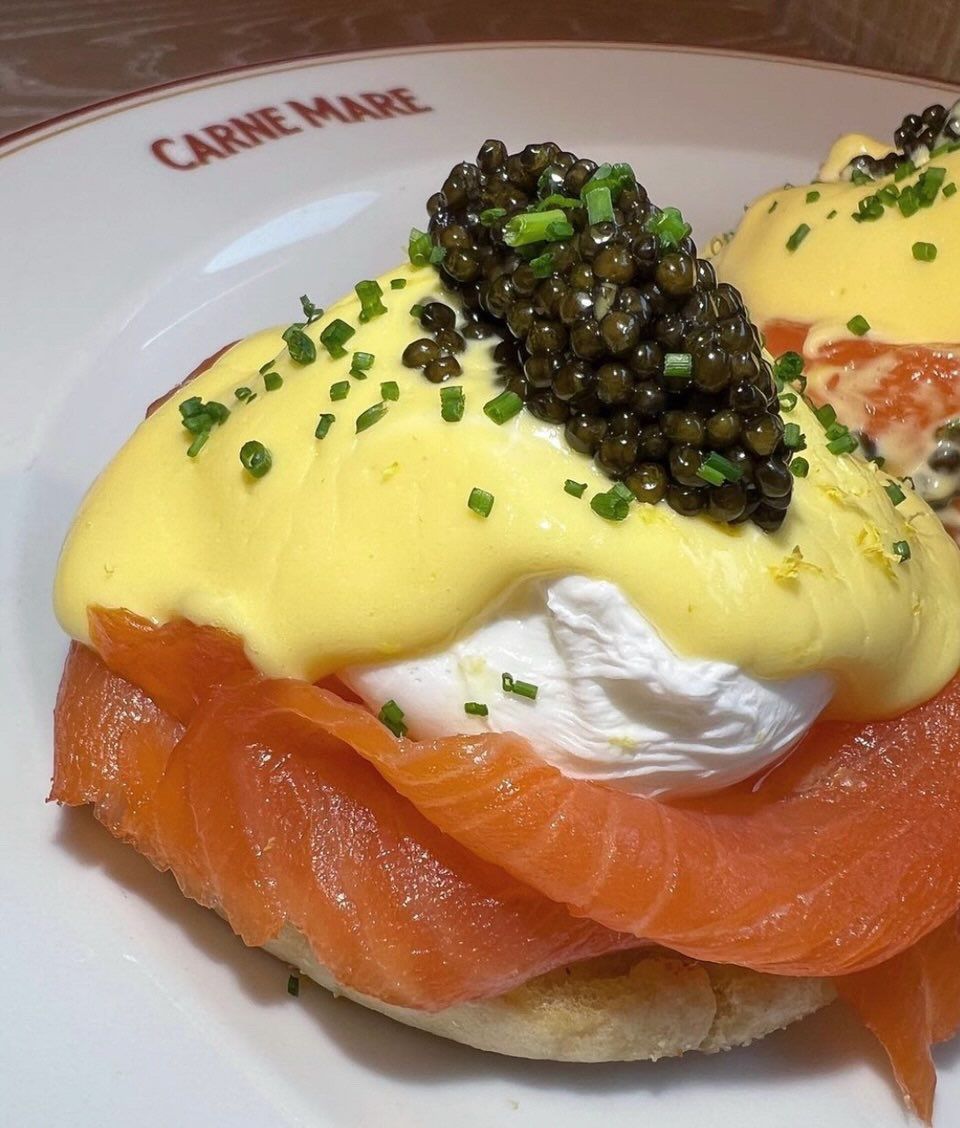
Beyond the technical skills, what do you look for in potential employees?
Brendan Scott: Often it's attitude over ability. If it's someone who is hungry and wants to learn, it's very important that they have an open mind coming into a different establishment, and they don't have tunnel vision about where they used to work and how they used to do this, because even branded restaurants that run the same, every establishment is a little bit different.
So just having an open mind to how the flow of service works and how the kitchen works, and also just having a good overall attitude and being nice to everybody.
Just teamwork too; you can see someone helps each other out, not someone who's all about themselves and worried about their table as a server!
You know what I mean? It's kind of like, you've got to be a team player and help everybody out. Because at the end of the day, without everybody working together, there is no restaurant, and there is no food. So everyone has to be a team player, open to working, and doing what needs to be done. You know what I mean? It's also when someone calls out sick. Everyone's got to pick up the slack.
So you might have to work six days now and again, but we all signed up to kind of do this in the restaurant industry, and it's all part of it. And, you know, I really respect having cooks that are like, yes, chef, “I'll take that six day” or yep, no problem, “I'll come in early because the prep cook called out," or, you know, having that as a chef in the kitchen and having a team that will back you up, very important.
You can see those people quite early in the kitchen if you've been doing this. Who are the team players, and who aren't? So if you've really been a team player, good attitude, de and skills can be taught, and recipes can be learned. So it's just the real attitude for me that's most important in this day and age, you know.
Check out more interviews like this brought to you by OysterLink, or get them straight to your email by creating an OysterLink account and joining our newsletter.
